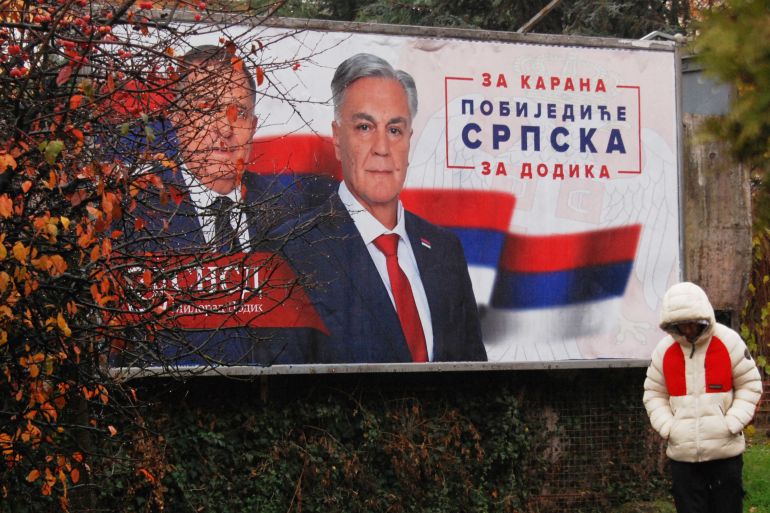Voters in Republika Srpska elect new leader after separatist Dodik’s ouster
Vote occurs amid rising secessionist rhetoric in the Serb-majority entity and Milorad Dodik’s defiance of the Dayton peace treaty.

By Al Jazeera Staff and News Agencies
Published On 23 Nov 202523 Nov 2025
Save
People are casting their votes in Republika Srpska, Bosnia and Herzegovina’s Serb-majority political entity, in a snap presidential election called after electoral authorities stripped separatist Bosnian Serb leader Milorad Dodik of the presidency in August.
Dodik was removed from office for defying Bosnia’s international peace envoy, Christian Schmidt, after his conviction for ignoring rulings by the international appointee, who oversees a peace deal that has held Bosnia together since the end of its 1992-1995 war, which killed tens of thousands of people and displaced hundreds of thousands more.
Recommended Stories
list of 3 itemsend of list
The court also handed him a one-year prison sentence, which he avoided by posting bail, and banned him from participating in politics for six years. Bosnia’s top court upheld that ruling in early November.
The election is seen as a crucial test of support for Dodik’s nationalist party, which has been in power for nearly two decades.
The early vote means the winner will serve less than a year before a general election in October. About 1.2 million voters are eligible to choose between six candidates.
The two main favourites to replace Dodik are Sinisa Karan, a 63-year-old former interior minister who is a close ally and Dodik’s personal choice. Dodik remains head of his party, the Union of Independent Social Democrats.
The main opposition group, the Serb Democratic Party, selected Branko Blanusa, a 56-year-old electrical engineering professor who has repeatedly levelled corruption allegations against Dodik and his party.
Advertisement
Preliminary results are expected on election night, but the final official vote count by the Central Election Commission will be announced only after the body also validates all outcomes.
Republika Srpska is one of two main political entities within Bosnia along with the Federation of Bosnia and Herzegovina, each of which enjoys significant autonomy. The two share equal rights over a third, small self-governing administrative unit within the country, known as the Brcko District.
Republika Srpska was proclaimed by Bosnian Serb leaders in 1992 at the start of the war and was formally established as part of Bosnia’s post-war constitutional structure in 1995 under the Dayton peace agreement.
Today, it is overwhelmingly Serb-populated with Serbs making up 82 percent of its residents alongside smaller Bosniak and Croat minorities, according to the latest census, which was held more than a decade ago in 2013.
Its first president, Radovan Karadzic, has been sentenced to life by the International Criminal Tribunal for the former Yugoslavia in The Hague for the 1995 genocide against Bosniaks in Srebrenica, now a town inside Republika Srpska.

